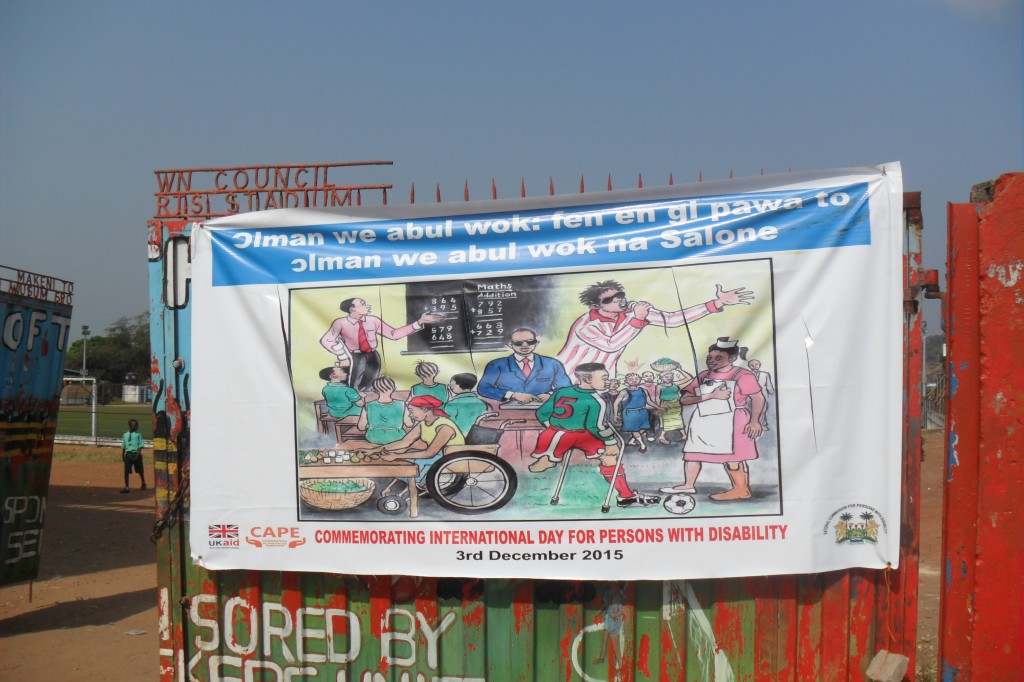Engaged Anthropology Grant: Diana Szanto
 Diana Szanto, then a student at the University of Pecs, Pecs, Hungary, was awarded the Dissertation Fieldwork Grant in May 2010, to aid research on ‘Engaging with Disability: NGOs between Global and Local Forces in the Post-Conflict Reconsolidation of Sierra Leone,’ supervised by Dr. Gabor Vargyas. This research project investigates the interplay between local and international NGOs in the context of the Sierra Leonean post-war reconstruction focusing specifically on the field of disability. In 2015, she received the Engaged Anthropology Grant to follow-up her research and share her results with the community that hosted her.
Diana Szanto, then a student at the University of Pecs, Pecs, Hungary, was awarded the Dissertation Fieldwork Grant in May 2010, to aid research on ‘Engaging with Disability: NGOs between Global and Local Forces in the Post-Conflict Reconsolidation of Sierra Leone,’ supervised by Dr. Gabor Vargyas. This research project investigates the interplay between local and international NGOs in the context of the Sierra Leonean post-war reconstruction focusing specifically on the field of disability. In 2015, she received the Engaged Anthropology Grant to follow-up her research and share her results with the community that hosted her.
Dr. Diana Szanto, University of Pécs, Hungary and president of Artemisszio Foundation, Budapest (Hungary) received an Engaged Anthropology grant to share the results of her PhD research with disabled people living in Sierra Leone, members of the disability elite as well as NGO staff working in the field of disability. To meet these different publics she organised four types of actions. She had a short intervention in front of state officials and leaders of the disability movement, she organised a 2 day workshop on disability activism for active members of disabled organisations and she facilitated a discussion with the joint participation of NGO workers and disability activists. Finally, she visited the different collective homes managed by polio-disabled people which had been the sites of her research. The objective of these activities was to construct a learning environment for people with disabilities and for NGO workers working with disabled people allowing them to reflect on their own practices and to discover together alternatives. Rather than a presentation chapter from chapter the grantee used the topics of the dissertation to generate ideas and debates. The long and tedious preparation of the different actions as well as the actual realisation of the program can be considered as an extension of the field work, allowing testing the conclusions of the dissertation. The mission took place at a moment when the disability movement was undergoing transformation and the opportunity for self-reflection was welcomed and well used by the participants.
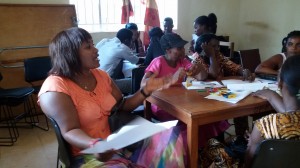 When I decided to apply for the Engaged Anthropology Program it certainly seemed to be the right thing to do. After all I had spent years in Sierra Leone observing organisations of people with disability. It was obvious that the people who nourished my thesis with their infinite patience, tolerating my presence and answering my naïve questions had the right to know what I wrote about them. Besides, immodestly, I secretly hoped that my objectifying gaze would contribute to the revitalisation of the Sierra Leonean disability movement in particular, and that of the Sierra Leonean civil society, in general.
When I decided to apply for the Engaged Anthropology Program it certainly seemed to be the right thing to do. After all I had spent years in Sierra Leone observing organisations of people with disability. It was obvious that the people who nourished my thesis with their infinite patience, tolerating my presence and answering my naïve questions had the right to know what I wrote about them. Besides, immodestly, I secretly hoped that my objectifying gaze would contribute to the revitalisation of the Sierra Leonean disability movement in particular, and that of the Sierra Leonean civil society, in general.
My dissertation demonstrated that paradoxically, more the empowerment and capacity building of civil society was emphasized as a central element of the post-conflict democratisation process, more grassroots organisations became disempowered. Incorporated progressively by the power structure, they were losing their capacity to defend the basic interests of their constituency. The heavy top- down civil society building and the formatting of the Sierra Leonean civil society according to the mould of what I called “project society” ultimately led to the depoliticisation of potentially subversive popular movements. My aim was to show that re-politicisation was not only necessary but also possible.
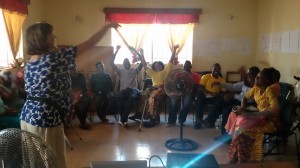 My proposed methodology was composed of four types of interventions, each of them reaching a different public. My plan was blatantly over-ambitious but I did not want to miss any relevant audience. First, I had to reach the senior leadership of the disability movement. Second, I had to create space for discussion with the most active members of grassroots organisations. Third, I owed some sort of recapitulation to international NGOs as well. Fourth, I wanted to visit one by one the self-managed collective polio-homes which used to be the main sites of my observations. That was the easiest thing to do, as I had friends to see in most of them. The other three points on my agenda proved to be much more complicated to realize.
My proposed methodology was composed of four types of interventions, each of them reaching a different public. My plan was blatantly over-ambitious but I did not want to miss any relevant audience. First, I had to reach the senior leadership of the disability movement. Second, I had to create space for discussion with the most active members of grassroots organisations. Third, I owed some sort of recapitulation to international NGOs as well. Fourth, I wanted to visit one by one the self-managed collective polio-homes which used to be the main sites of my observations. That was the easiest thing to do, as I had friends to see in most of them. The other three points on my agenda proved to be much more complicated to realize.
I counted on using my old connections but I quickly understood that since my last visit the power relations had changed again and I was obliged to re-learn to navigate in the dangerously moving field of disability politics. I spent almost two months preparing the actions I had proposed, meeting with decision makers, visiting state institutions, civil society organisations and NGOs. I was already losing hope to ever come to terms with my mission, when miraculously all of a sudden all the obstacles were swept away. It was not because I was particularly convincing. I was just lucky. I arrived at the right moment. People were longing for change.
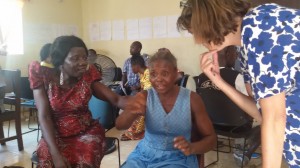 All the processes I had observed before had been only exacerbated since the end of my field work. The gap between the senior leadership and the lay members of disabled organisations had widened. While the former were offered lucrative government positions, the latter saw literally no change in their lives. Poverty and vulnerability remained unchallenged. Not a single point of the Disability Act was implemented since its enactment in 2011, except for the creation of a costly but highly inefficient National Commission, which drew virtually all disabled organisations under the control of the state. Evictions stopped, but probably more because of Ebola than because of a conscious political decision to put an end to the chronic housing insecurity. The lack of access to public services worsened. The disability movement was more fractured than ever, visibly losing momentum as it was gradually institutionalised. Disabled people, disability activists and NGO workers alike were getting weary.
All the processes I had observed before had been only exacerbated since the end of my field work. The gap between the senior leadership and the lay members of disabled organisations had widened. While the former were offered lucrative government positions, the latter saw literally no change in their lives. Poverty and vulnerability remained unchallenged. Not a single point of the Disability Act was implemented since its enactment in 2011, except for the creation of a costly but highly inefficient National Commission, which drew virtually all disabled organisations under the control of the state. Evictions stopped, but probably more because of Ebola than because of a conscious political decision to put an end to the chronic housing insecurity. The lack of access to public services worsened. The disability movement was more fractured than ever, visibly losing momentum as it was gradually institutionalised. Disabled people, disability activists and NGO workers alike were getting weary.
If I was critical, what I had to say could not surprise anybody any more. Still, I was looking forward a little bit nervously to speaking about these issues publicly. The cross-disability Symposium organised by the National Disability Commission was the occasion I was waiting for. Despite the long negotiations I had conducted beforehand, I was not sure if I would really get a chance to talk. When the chairman invited me to the high table I grabbed happily the opportunity to speak about the wonderful things I learned during my fieldwork: disabled people organising themselves in self-sustaining, self-managing communities, providing shelter, economic opportunity, sociability, social security to their members, including a great number of non-disabled people whom they integrate! That was an extraordinary integration model the world should know about – I said.
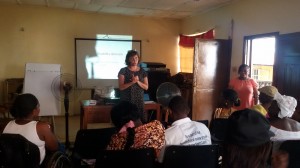 An outsider would not have found my speech particularly controversial. I knew however that I was challenging a powerfully dominant model of self-representation. For too long time the self-identity of disabled people was constructed on the basis of self-pity, victimisation and on the sharp opposition between the disabled and the non-disabled world, the latter usually depicted as necessarily hostile. My speech stuck out from the long litany of complaints and accusations. By attacking the invisible wall built between people with disability and their environment living in the same poverty I was putting in question the taken for granted supposition that disabled people only can claim rights on the account of their disability. That was to shake the fundaments of disability politics.
An outsider would not have found my speech particularly controversial. I knew however that I was challenging a powerfully dominant model of self-representation. For too long time the self-identity of disabled people was constructed on the basis of self-pity, victimisation and on the sharp opposition between the disabled and the non-disabled world, the latter usually depicted as necessarily hostile. My speech stuck out from the long litany of complaints and accusations. By attacking the invisible wall built between people with disability and their environment living in the same poverty I was putting in question the taken for granted supposition that disabled people only can claim rights on the account of their disability. That was to shake the fundaments of disability politics.
I used the occasion of the symposium to invite a few people to a workshop on disability activism that I was to deliver the next days. The workshop was originally planned for 3 days but I had to shorten it to 2 because of the celebrations of the International Disability Day that the Commission organised the same week – probably as a political gesture – in the hometown of the President. I took it as a good sign that despite the busy week around 20 people turned up the next morning. That was the second and most important phase of my program and I was extremely grateful to a friend who helped me with the organisation and agreed to co-facilitate the training with me.
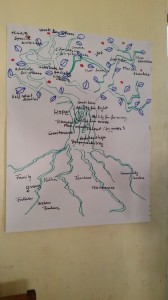 We started the discussion with the participants by mapping the most burning global challenges, discussing each time how these problems concerned them and what solutions they could propose. We then analysed a film on the beginning of disability activism in the USA (Lives worth living), trying to define the conditions of a successful popular mobilisation. We used the tool of the Tree of Life (http://dulwichcentre.com.au/the-tree-of-life/) – to make collective strengths, resources, dreams and needs emerge in a symbolic language, and discussed possible strategies to transform basic needs into rights. We also familiarised ourselves with Forum Theatre.
We started the discussion with the participants by mapping the most burning global challenges, discussing each time how these problems concerned them and what solutions they could propose. We then analysed a film on the beginning of disability activism in the USA (Lives worth living), trying to define the conditions of a successful popular mobilisation. We used the tool of the Tree of Life (http://dulwichcentre.com.au/the-tree-of-life/) – to make collective strengths, resources, dreams and needs emerge in a symbolic language, and discussed possible strategies to transform basic needs into rights. We also familiarised ourselves with Forum Theatre.
Instead of directly speaking of my dissertation I was rather leading my public to formulate their own learning points, testing at the same time my own conclusions. Luckily the two overlapped! Here are some lines of my notes:
1, Any collective mobilisation should start with an analysis of the actual nature and source of oppression. Embracing an agenda developed in different circumstances in other parts of the world does not necessarily give the right answers.
2, The overemphasising of discrimination leaves little place to the recognition of the support disabled people remember having received from family, community and teachers. Recognising this support is not in contradiction with condemning discrimination wherever it happens, but it helps realise possible resources existing in Sierra Leonean society.
3, Most of the imminent needs of people with disability do not differ from those of their non-disabled peers living in the same poverty. What disabled people want are housing security, access to education, health and availability of jobs. On the long run transforming these needs into universal rights might be a more efficient strategy to obtain satisfaction than claiming for special rights on account of disability.
4, Special rights should be claimed wherever special needs exist and are denied. Access to rehabilitation services and to assistive devices is a case in point.
5, In the context of extreme scarcity and of many unsatisfied needs the goals should be prioritized. In setting up the order of priorities the leaders of the movement should make sure they represent the interests of the most vulnerable amongst them.
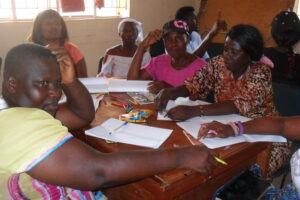 After the workshop I still had time to travel to Makeni for the International Disability Day in the company of my participants, come back to Freetown and finish the week with a last intervention in Handicap International, the NGO that had hosted me in the early stage of my field work. Originally this was to be a special presentation of my dissertation for NGO workers but in the last moment I had the good idea to invite some local leaders of the disability movement. What I had foreseen more or less as a monologue finally turned out to be a lively discussion where international NGO workers, Sierra Leonean disability activists and the anthropologist mutually learned a lot from each other.
After the workshop I still had time to travel to Makeni for the International Disability Day in the company of my participants, come back to Freetown and finish the week with a last intervention in Handicap International, the NGO that had hosted me in the early stage of my field work. Originally this was to be a special presentation of my dissertation for NGO workers but in the last moment I had the good idea to invite some local leaders of the disability movement. What I had foreseen more or less as a monologue finally turned out to be a lively discussion where international NGO workers, Sierra Leonean disability activists and the anthropologist mutually learned a lot from each other.
When this extraordinary week ended I had one single thought: I made it! Incredible as it seems, everything happened according to plans. Even better. I can even suppose that I have sown some seeds that will later germinate. But did I really make it? Will my dissertation make any difference –in understanding disability, civil society or Sierra Leone as a country? Will its presentation have a lasting effect on the Sierra Leonean disability movement? Only with time shall I know, or never. But at least I have a feeling of completion now. I did what I could. And I learned again. I thought I had a big esteem for the subjects of my research but I am afraid I have underestimated them. I should not have been worried to “bring them back the results”. They were more than ready for it. I am sincerely grateful to Wenner-Gren for this lesson.
